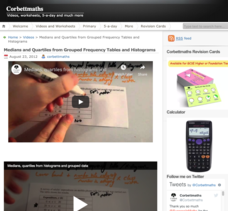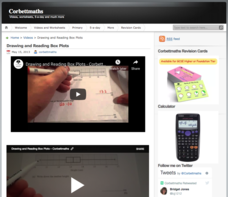Curated Video
Best Fit
A video entitled "Best fit" which explains how to calculate measures of center and measures of variation and discusses how to determine the value that best represents a data set.
Curated Video
Julia for Data Science (Video 17)
Julia is an easy, fast, open source language that if written well performs nearly as well as low-level languages such as C and FORTRAN. Its design is a dance between specialization and abstraction, providing high machine performance...
Curated Video
Learning R for Data Visualization (Video 8)
R is on the rise and showing itself as a powerful option in many software development domains. At its core, R is a statistical programming language that provides impressive tools for data mining and analysis, creating high-level...
Curated Video
The Complete Excel Guide: Beginners to Advanced - Statistical Functions for Description - Part 2
The aim of this video is to further explore statistical functions for description. This clip is from the chapter "Excel 2019 Advanced: Statistical Functions" of the series "The Complete Excel Guide: Beginners to Advanced".In this...
KnowMo
Introduction to Quartiles and Interquartile Range
This video is a tutorial on quartiles and interquartile range. The speaker explains the concept of quartiles and their usefulness in analyzing data distribution. The video discusses how quartiles can be used to identify specific points...
Curated Video
Box and Whisker Plots: Understanding and Creating Them
In this video, students will learn about box and whisker plots, a visual way to display data distribution using five values: minimum, maximum, median, lower quartile, and upper quartile. The video explains how to interpret and create box...
Curated Video
Creating a Box Plot: Representing Data on a Number Line
In this video, we learn how to create a box plot to represent data on a number line. Understand the concept of quartiles and explore how to find the minimum, maximum, and quartiles of a data set. By the end of the lesson, students will...
Curated Video
Quartiles and Interquartile Range
Find the minimum, maximum, quartiles, and Interquartile range for a data set.
Curated Video
Calculating and Comparing Data Spread Using Interquartile Range
In this video, the teacher explains how to calculate and compare the spread of data sets using the interquartile range. The interquartile range helps determine the range of the middle half of the data, which is especially useful when...
KnowMo
Introduction to Box Plots: Understanding and Constructing Them
This video explains what box plots are and how to interpret and construct them. It provides specific information on the different components of a box plot, including the minimum and maximum values, quartiles, range, and median. The video...
KnowMo
Understanding Quartiles and Box Plots for Data Analysis
This video explains the concept of quartiles and box plots, which are used to analyze and visualize data sets. The video also explains how to determine the quartiles using a cumulative frequency graph and how to draw a box plot to...
Curated Video
Representing Outliers in a Boxplot Using Quartiles
In this video, students learn how to represent outliers in a boxplot by using quartiles. The video explains the five-number summary of a boxplot and demonstrates how to calculate the interquartile range. It then shows how to identify and...
Curated Video
Creating a Box Plot: Graphically Representing Data
This video, covers the three main components of a box plot: the box shape, the 50% of data contained within the box, and the five-number summary that provides the structure. The video also clarifies misconceptions about interpreting the...
Curated Video
Identifying Outliers in Data Sets Using Quartiles
In this video, the teacher explains how to identify outliers in data sets using quartiles. They use the example of temperature data in Chicago to demonstrate the process. The teacher emphasizes the importance of not simply dismissing...
Flipped Math
Boxplots and Interquartile Range
Box in a lesson on box plots. Viewers of an informative video learn how to create box plots, both by hand and by using a graphing calculator. Additionally, they determine the interquartile range and interpret the value in terms of the...
Corbett Maths
Medians and Quartiles from Grouped Frequency Tables and Histograms
Determine medians within a group. Given data represented as a frequency table of grouped data, the video demonstrates finding an estimation for the median. After finding the group where the median resides, the presenter uses a formula to...
Anywhere Math
Box-and-Whisker Plots
Whiskers are more than just a cat facial feature! Learn how the whiskers of a box-and-whisker help make conclusions about a data set. An instructor first explains how to create a box-and-whisker and then how to read it. Several examples...
Corbett Maths
Reading Cumulative Frequency Graphs
Creating a cumulative frequency graph is one thing, reading them is another. A thorough video lesson explains how to find key information from a cumulative frequency graph. The instructor demonstrates the best way to read the graph and...
Corbett Maths
Drawing and Reading Box Plots
Box and whiskers have more to do with data than they do with cats! A video lesson describes how to plot, analyze, and compare box plots. Mathematicians first learn to create a box plot and then how to use information about the quartiles...
Anywhere Math
Measures of Variation
Variation makes the world—and data sets—more interesting. Young data analysts view an engaging YouTube video to learn about measures of variation. Range and interquartile range are the topics under consideration here.
Crash Course
Measures of Spread: Crash Course Statistics #4
Sometimes the measures of center don't give us enough information. The spread of the data can tell statisticians much more about the data set. A video lesson, part of a statistics video series, describes different measures of spread such...
Curated OER
How Do You Find the Minimum, Maximum, Quartiles, and Median of a Data Set?
The data sample comes from the number of glasses of water consumed each day by 15 students. You are trying to find minimum, maximum, median, and quartile from this data set. Minimum is the smallest number that occurs, while maximum is...








